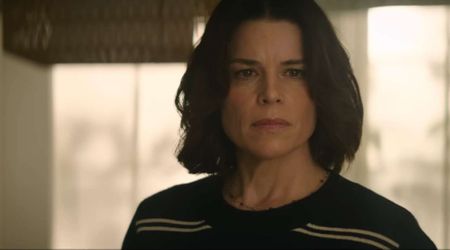'Shirley' stars Elisabeth Moss and Michael Stuhlbarg say the horror film is 'thrilling, tense and twisted'

'Shirley', a horror thriller based on Susan Scarf Merrell's novel of the same name, made its world premiere at the Sundance Film Festival on January 25, 2020.
The film chronicles a young couple who move in with Shirley Jackson and her husband, Professor Stanly Hyman, to start a new life. They find themselves immersed in a "psychodrama" making for an intense film directed by Josephine Decker.
Elizabeth Moss plays the role of Shirley Jackson while Michael Stuhlbarg essays the role of Stanley Edgar Hyman. In an exclusive interview with MEA WorldWide (MEAWW), Moss talks about how she had "padding" while playing Shirley while Stuhlbarg dishes on the research behind the scenes.
When asked if she knew she would be wearing make-up prosthetics while enacting the role of Shirley, Moss says, "I had a little bit of padding, which was fun actually, cause I didn't really have. Normally I feel like I'm trying to suck it all in and it was actually nice to go the opposite way. I have aging makeup on, a wig and the whole nine yards."
Stuhlbarg chimes in to explain what made him jump on the role of Hyman, crediting the director and writer of the film. "Josephine Decker really is just such a great filmmaker, just to one of the boldest, unique voices out there. I wanted to support her vision. I just love her."
He adds his reaction to what's real or not when it comes to the film, saying, "Yeah, it's hard to tell (what's real and what is not). I would say just please watch the movie and I hope you enjoy it, but it's a thrilling, tense and twisted movie."
He continues on how he added layers to the portrayal of his character, using the aid of research. "I actually got a chance to meet a couple of people who knew Stanley and surely one of them was a babysitter of theirs who was also a student of Stanley's. And the other was an old friend of Stanley."
"We grew up with Walter Bernstein, who's a very accomplished writer in his own merit. Hearing what they had to say about the real people, you take that in. And the story we were telling I learned quite quickly was not meant to be any kind of bio-epic."
"It was sort of taking these people who really lived learning as much about them as possible, and then putting them in a fictional circumstance and seeing where that might take us," Stuhlbarg adds.










